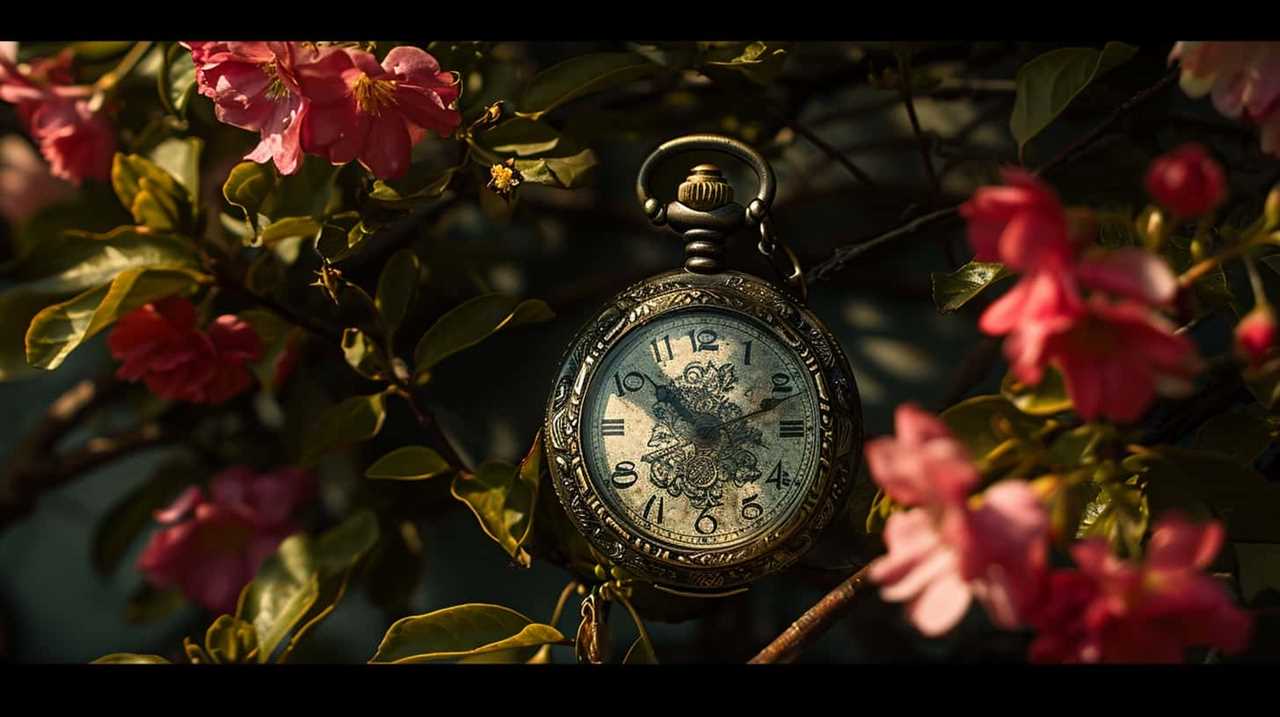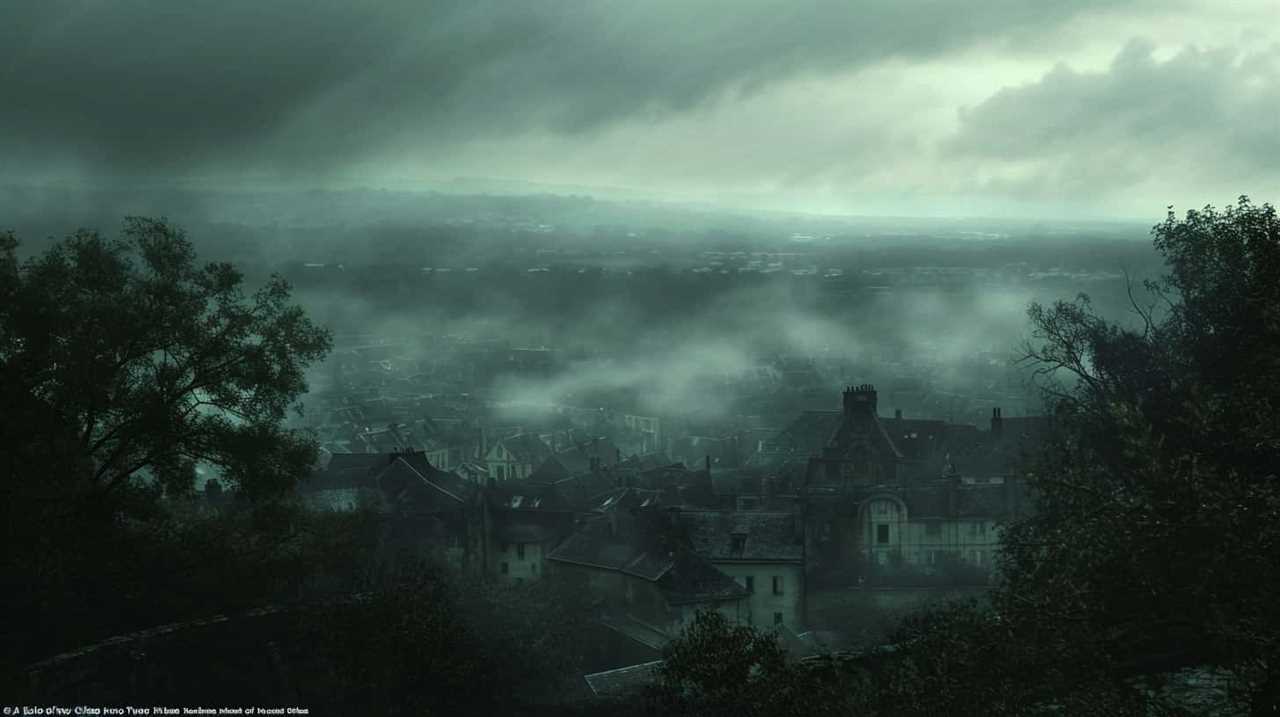Have you ever found yourself searching for answers, contemplating the purpose of your existence?
Dive into the enchanting world of classic literature, where timeless quotes hold the power to unlock life’s mysteries.
Through the pages of these literary masterpieces, you can embark on a journey of self-discovery and introspection. Immerse yourself in the vivid imagery and profound insights of iconic authors, as they take you on a quest to decipher life’s meaning.
From the depths of despair to the heights of triumph, these classic literary quotes provide a unique perspective on the human condition.

So, grab a cup of coffee, settle into your favorite reading nook, and let the wisdom of the ages guide you in your search for purpose and fulfillment.
Key Takeaways
- Classic literature offers profound perspectives on the meaning of existence, providing readers with insights into the search for meaning in their own lives.
- Characters in classic novels grapple with existential questions, prompting readers to contemplate their own purpose and sense of identity.
- Classic novels often present moral dilemmas and explore the consequences of ethical choices, allowing readers to reflect on their own values and principles.
- Classic literature contains timeless wisdom and universal truths that resonate across generations, providing guidance and inspiration in the search for meaning in life.
The Meaning of Existence in Classic Literature
If you’re searching for deeper insight into the meaning of existence, classic literature offers a wealth of profound perspectives. The search for life’s meaning in literature is a quest that has captivated readers for centuries. In classic novels, authors have explored the complexities of human existence and grappled with the timeless question of purpose. Through their words, they invite us to join them on a journey of self-discovery and contemplation.
In the pages of classic novels, we find characters who are also on a quest to find meaning in their lives. From the brooding introspection of Hamlet to the philosophical musings of Jane Eyre, these literary works offer us glimpses into the human condition and prompt us to reflect on our own purpose. As we immerse ourselves in the stories and the lives of these characters, we’re challenged to question our own beliefs and values, and to consider what truly gives our lives meaning.
Classic literature has the power to ignite our imaginations and inspire us to think beyond the confines of our everyday lives. It encourages us to explore the depths of our own souls and to search for meaning in the world around us. So, if you’re seeking a profound and transformative reading experience, look no further than the pages of classic novels.

In the subsequent section, we’ll delve deeper into the ways in which these timeless works help us in finding purpose in our own lives.
Finding Purpose in the Pages of Classic Novels
Discover purpose within the pages of classic novels and embark on a transformative journey of self-reflection and introspection. Classic literature has the power to transport you to different worlds, allowing you to explore existentialism and find meaning in the lives of complex and relatable characters. As you delve into these timeless stories, you’ll uncover profound insights and gain a deeper understanding of your own existence.
Here are four ways in which classic novels can help you in your quest for purpose:
- Characters as mirrors: Classic novels often feature characters who grapple with existential questions and search for their own sense of purpose. By immersing yourself in their journeys, you can reflect on your own experiences and gain new perspectives on your own search for meaning.
- Themes of identity and self-discovery: Many classic novels delve into themes of identity and self-discovery, inviting readers to contemplate their own sense of self. Through the struggles and triumphs of the characters, you can gain insights into your own journey of self-exploration.
- Moral dilemmas and ethical choices: Classic novels often present moral dilemmas and explore the consequences of ethical choices. By engaging with these narratives, you can reflect on your own values and principles, and consider how they shape your purpose in life.
- Timeless wisdom and universal truths: Classic novels contain timeless wisdom and universal truths that resonate across generations. Through the pages of these novels, you can find solace, guidance, and inspiration as you navigate your own path towards finding meaning.
In the world of classic literature, you have the opportunity to delve into the depths of human experience, exploring existentialism and finding meaning in the intricate tapestry of life. So, pick up a classic novel and let its words guide you on a profound journey of self-discovery and purpose.

Exploring Life’s Significance in Timeless Literary Works
Delve into the depths of timeless literary works to uncover the profound significance of life. In the realm of literature, authors have long been exploring existentialism and identity, offering readers a unique perspective on the complexities of human existence. From the existential musings of Albert Camus in ‘The Stranger’ to the exploration of personal identity in Virginia Woolf’s ‘Mrs. Dalloway,’ these works invite us to contemplate our place in the world and the meaning we assign to our own lives.
Existentialism, a philosophical movement that emerged in the 20th century, emphasizes individual existence, freedom, and responsibility. Through literature, authors like Fyodor Dostoevsky in ‘Notes from Underground’ and Jean-Paul Sartre in ‘Nausea’ delve into the existential themes of alienation, absurdity, and the search for meaning. These works challenge us to question the nature of our own existence and the choices we make in shaping our lives.
Identity, another recurring theme in literature, is explored in various ways. In Hermann Hesse’s ‘Steppenwolf,’ the protagonist grapples with his dual nature, torn between his human and wolf-like instincts. In Toni Morrison’s ‘Beloved,’ the characters confront the impact of slavery on their identities, highlighting the struggle to define oneself in the face of societal oppression.
Through the power of literature, we’re given the opportunity to explore existentialism and identity, expanding our understanding of the profound significance of life. These timeless works continue to captivate readers, offering insights and perspectives that challenge us to contemplate our own existence and the meaning we derive from it.

Philosophical Insights Into the Human Condition
As you embark on an exploration of philosophical insights into the human condition, you’ll encounter the profound themes of existential angst, the universality of suffering, and the eternal search for purpose.
Through classic literary quotes, authors have masterfully captured the complexities of our existence, delving into the depths of human emotions and experiences.
These quotes serve as poignant reminders that, amidst the chaos of life, we’re all bound together by our shared struggles and the eternal quest for meaning.
Existential Angst in Literature
How can literature provide insights into the existential angst of the human condition?

Literature has the power to delve deep into the complexities of the human experience, offering profound insights into our existential crisis and the search for meaning. Through the words of skilled authors, we’re transported into the minds of characters who grapple with the same existential questions that plague us all.
Here are four ways literature can help us understand and navigate our own existential angst:
- Exploration of the human condition: Literature allows us to explore the depths of human emotions, thoughts, and experiences, shedding light on the universal struggles we face in our search for meaning.
- Reflection on mortality and purpose: By confronting our mortality and contemplating the purpose of our existence, literature challenges us to confront our own existential angst.
- Examination of identity and authenticity: Through complex characters and their journeys, literature prompts us to question our own identities and the authenticity of our choices.
- Provoking philosophical contemplation: Literature often raises profound philosophical questions about the nature of reality, free will, and the meaning of life, inviting readers to engage in deep contemplation.
Suffering as Universal Experience
Through literature, you can further explore the universal human experience by delving into the philosophical insights of suffering as a shared condition. Suffering, in its various forms, is an intrinsic part of the human experience, transcending boundaries of time, culture, and social status. It’s a universal thread that connects us all, reminding us of our vulnerability and mortality.
In literature, authors have long used suffering as a lens through which to examine the existential nature of our existence. It’s through the exploration of suffering that we gain a deeper understanding of the complexities of the human condition. From the tragic heroes of Shakespeare to the tormented souls of Dostoevsky, literature offers us a mirror to our own struggles and invites us on an existential journey of self-discovery.

The Search for Purpose
You can discover profound philosophical insights into the human condition by embarking on the search for purpose. This quest for fulfillment is a fundamental aspect of the human experience, as we all long to find meaning and direction in our lives.
As you navigate life’s uncertainties, pondering the purpose of your existence, consider the following:
- Reflect on your passions and values: What brings you joy and fulfillment? What principles do you hold dear? Understanding your own desires and beliefs can guide you towards a purposeful path.
- Seek connection and contribution: Engage with others and find ways to make a positive impact. By serving a greater cause or helping those in need, you can find a deeper sense of purpose.
- Embrace growth and self-discovery: Life’s journey is a continuous process of learning and evolving. Embrace opportunities for personal growth and explore new experiences to uncover your true purpose.
- Embrace the unknown: Accept that the search for purpose isn’t always straightforward. Embracing uncertainty allows for the possibility of unexpected discoveries and transformative experiences.
Uncovering Life’s Purpose Through Classic Poems
Discovering life’s purpose can be achieved by exploring the profound messages embedded within classic poems. Poetry has the power to evoke emotions, provoke thoughts, and inspire introspection. Through the artful arrangement of words, poets have explored the depths of human existence, unraveling the mysteries of life and offering insights into our purpose on this earth.
In classic poems, poets have delved into timeless themes such as love, nature, and the human condition, providing us with a rich tapestry of verses to contemplate. By reading and analyzing these poems, we can gain a deeper understanding of ourselves and our place in the world.

In order to illustrate this point, let’s explore a selection of classic poems and the profound insights they offer:
| Poem Title | Author | Key Themes |
|---|---|---|
| The Road Not Taken | Robert Frost | Choices, individuality, life’s journey |
| If— | Rudyard Kipling | Resilience, perseverance, moral strength |
| Ode to a Nightingale | John Keats | Beauty, mortality, escapism |
| The Waste Land | T.S. Eliot | Modern society, disillusionment, spiritual crisis |
These poems, among many others, invite us to reflect on the questions that lie at the core of our existence. They challenge us to contemplate our choices, find strength in adversity, appreciate the fleeting moments of beauty, and confront the complexities of the world we inhabit.
Through exploring life’s purpose through poetry, we can uncover profound insights that resonate with our own journeys and guide us towards a more meaningful existence. So, immerse yourself in the verses of classic poems and let them illuminate the path to discovering your purpose.
Reflections on the Meaning of Life in Classic Plays
Classic plays provide a multitude of thought-provoking reflections on the meaning of life. These timeless works of art delve into the depths of human existence, sparking contemplation and philosophical exploration. Whether it’s Shakespeare’s Hamlet contemplating the nature of mortality or Arthur Miller’s Death of a Salesman questioning the pursuit of the American Dream, classic plays offer profound insights into the human condition.

Here are four ways in which these plays offer reflections on life’s purpose:
- Examining the complexities of identity: Plays like Tennessee Williams’ A Streetcar Named Desire explore the struggle to find meaning and purpose in one’s own identity.
- Challenging societal norms: Henrik Ibsen’s A Doll’s House challenges traditional gender roles, prompting reflection on the limitations society places on individuals and the search for authentic selfhood.
- Exploring the consequences of actions: In Sophocles’ Oedipus Rex, the protagonist’s tragic fate forces us to ponder the role of free will and the impact our choices have on our lives.
- Questioning the pursuit of power: Shakespeare’s Macbeth delves into the destructive nature of ambition and the toll it takes on an individual’s morality and sense of purpose.
These plays encourage us to confront existential questions and contemplate the deeper meaning of our lives. By engaging with these reflections, we gain a greater understanding of ourselves and the world around us.
As we delve further into the exploration of life’s purpose, let’s now turn our attention to probing the depths of existential questions in literary quotes.
Probing the Depths of Existential Questions in Literary Quotes
Delve into the depths of existential questions through the profound insights offered by classic literary quotes. As you embark on an existential exploration through the realm of literature, you will uncover the deep and thought-provoking ideas that authors have expressed through their words. These literary introspections provide a unique lens through which we can ponder the meaning of life and our place in the world.

To evoke an emotional response and engage your senses, imagine a table that captures the essence of existential questioning. Each column represents a different aspect of our existence, while each row showcases a powerful quote that encapsulates the complexity of these philosophical inquiries. Allow these quotes to resonate within you, inspiring introspection and encouraging introspective discussions.
| Column 1: Identity | Column 2: Purpose | Column 3: Mortality |
|---|---|---|
| "To be yourself in a world that is constantly trying to make you something else is the greatest accomplishment." – Ralph Waldo Emerson | "The purpose of life is not to be happy. It is to be useful, to be honorable, to be compassionate, to have it make some difference that you have lived and lived well." – Ralph Waldo Emerson | "The fear of death follows from the fear of life. A man who lives fully is prepared to die at any time." – Mark Twain |
| "I think, therefore I am." – René Descartes | "The two most important days in your life are the day you are born and the day you find out why." – Mark Twain | "Life is what happens when you’re busy making other plans." – John Lennon |
| "To thine own self be true." – William Shakespeare | "The meaning of life is to find your gift. The purpose of life is to give it away." – Pablo Picasso | "Death is not the greatest loss in life. The greatest loss is what dies inside us while we live." – Norman Cousins |
These quotes, carefully chosen from the vast treasure trove of literature, invite you to contemplate the intricacies of your own existence. They encourage you to question your identity, search for purpose, and confront the inevitability of mortality. As you delve into these existential depths, may you find enlightenment and inspiration, and may these literary insights guide you on your quest for self-discovery and meaning.
Insights Into the Purpose of Life From Classic Authors
Discover the timeless wisdom of classic authors as they offer their insights into the purpose of life. Through their words, you’ll embark on a journey of self-reflection and introspection, uncovering the profound meanings hidden within the pages of literature.
From the existential ponderings of Sartre to the philosophical musings of Camus, these literary perspectives on purpose will challenge your beliefs and inspire you to find your own meaning in the world.

Get ready to explore the profound depths of human existence through the eyes of these literary giants.
Literary Perspectives on Purpose
Gain profound insights into life’s purpose through the timeless wisdom of classic authors. These literary perspectives on purpose provide a fresh and innovative approach to understanding the meaning of life.
Explore the depths of human existence as you delve into the works of these renowned authors:
- Leo Tolstoy: Discover the pursuit of happiness as a central theme in Tolstoy’s novels, where characters navigate the complexities of life and find their purpose amidst the chaos.
- William Shakespeare: Explore the role of fate in shaping purpose through Shakespeare’s plays, where characters grapple with destiny and the consequences of their choices.
- Jane Austen: Uncover the pursuit of happiness within the confines of societal expectations in Austen’s novels, where characters navigate love and marriage to find their true purpose.
- Fyodor Dostoevsky: Contemplate the existential quest for meaning through Dostoevsky’s works, where characters confront the depths of their own souls and grapple with the ultimate purpose of life.
These classic authors offer profound insights into the pursuit of happiness, the role of fate in shaping purpose, and the intricate complexities of human existence.

As we move forward, let’s now explore how literature can help us find meaning in our own lives.
Finding Meaning in Literature
As you delve further into the exploration of classic literature’s insights into the purpose of life, you will discover a wealth of meaning waiting to be deciphered through the timeless wisdom of renowned authors. Finding meaning in literature is like embarking on a journey through the depths of the human condition, where poetry becomes a guide to unravel the mysteries of existence. Through the poignant verses of poets like William Wordsworth and Emily Dickinson, you can uncover profound insights into the complexities of life and the interconnectedness of all things. Their words, like delicate brushstrokes on the canvas of the mind, paint vivid images and evoke deep emotions. Allow yourself to be captivated by their metaphors, their rhythms, and their raw vulnerability as you navigate the intricate tapestry of human experience. The table below showcases a glimpse of the profound wisdom waiting to be discovered in the world of poetry:
| Poet | Quote | Meaning |
|---|---|---|
| William Wordsworth | "The world is too much with us…" | Urges us to reconnect with nature and find solace |
| Emily Dickinson | "Hope is the thing with feathers…" | Explores the power of hope in difficult times |
| Robert Frost | "Two roads diverged in a wood…" | Reflects on the choices we make and their impact |
| Maya Angelou | "Still I rise…" | Celebrates resilience and the triumph of the spirit |
Through these poetic insights, you can embark on a personal quest to uncover the deeper meaning of life and gain a greater understanding of your place in the world.
Contemplating Life’s Meaning in Classic Fiction
Explore the profound existential questions raised in classic fiction as you delve into the depths of life’s meaning. Classic literature has always been a rich source of contemplation, offering readers a window into the complexities of the human experience. Through timeless narratives, authors have skillfully captured the essence of life, prompting us to ponder our own existence.

Here are four ways in which classic fiction invites us to contemplate life’s meaning:
- Existential crisis in classic novels: From Albert Camus’ ‘The Stranger’ to Fyodor Dostoevsky’s ‘Crime and Punishment,’ classic literature often explores the existential crisis faced by its characters. These novels delve into the fundamental questions of purpose, identity, and the nature of reality, challenging readers to reflect on their own place in the world.
- Quest for self-discovery in timeless literature: Many classic works revolve around the protagonist’s journey of self-discovery. Whether it’s Jane Eyre’s search for independence and love in Charlotte Bronte’s novel or Huckleberry Finn’s quest for freedom in Mark Twain’s ‘The Adventures of Huckleberry Finn,’ these stories inspire us to examine our own lives and understand the true nature of our own identities.
- Symbolism and metaphor: Classic fiction often employs symbolism and metaphor to convey profound philosophical ideas. Through these literary devices, authors like Virginia Woolf and Herman Melville challenge us to search for deeper meanings and truths within the narrative, encouraging us to question the nature of reality and our place in it.
- Reflection on the human condition: Classic fiction offers a unique lens through which we can reflect on the complexities of the human condition. Whether it’s exploring themes of love, loss, morality, or the passage of time, these works provide us with a deeper understanding of ourselves and the world around us.
As you immerse yourself in the world of classic fiction, be prepared to embark on a journey of self-reflection and contemplation. These timeless tales have the power to illuminate the mysteries of life and guide us on a path towards greater understanding and meaning.
Philosophical Musings in Time-Honored Literary Texts
Delving into the philosophical musings of time-honored literary texts allows you to uncover profound insights about life’s meaning. These texts, often considered classics, provide a rich tapestry of ideas and thoughts that explore existentialism and analyze literary symbolism. By immersing yourself in these works, you embark on a journey of self-discovery and intellectual exploration.
One of the key aspects of exploring existentialism through literature is the examination of the human condition. These texts often depict characters grappling with the fundamental questions of existence, such as the purpose of life and the nature of reality. Through their struggles and contemplations, you gain a deeper understanding of your own place in the world and the choices that shape your life.

Literary symbolism, on the other hand, offers a unique lens through which to view the complexities of life. Symbols are often used to convey deeper meanings and emotions, transcending the literal and inviting readers to interpret and analyze. By engaging with these symbols, you’re encouraged to question and reflect on the underlying themes and messages of the text, ultimately leading to a richer understanding of life and its intricacies.
Literary Quotes That Illuminate Life’s Purpose
Embarking on a journey of self-discovery and intellectual exploration, you’ll find that classic literary quotes have the power to illuminate life’s purpose. Through exploring life’s purpose through poetry and philosophical reflections in classic literature, you’ll uncover profound insights that resonate with your own existential journey. Here are four literary quotes that offer profound perspectives on life’s purpose:
- ‘To thine own self be true.’ – William Shakespeare, Hamlet
This quote reminds us of the importance of authenticity and staying true to our values and beliefs. It suggests that our purpose lies in embracing our true selves and living in alignment with our core values. - ‘The only way to do great work is to love what you do.’ – Steve Jobs
This quote highlights the significance of finding passion and fulfillment in our work. It suggests that our purpose can be found in pursuing our passions and doing work that brings us joy and fulfillment. - ‘I am no bird; and no net ensnares me.’ – Charlotte Brontë, Jane Eyre
This quote embodies the idea of personal freedom and liberation. It suggests that our purpose lies in breaking free from societal expectations and limitations, and embracing our own unique path. - ‘The purpose of life isn’t to be happy. It’s to be useful, to be honorable, to be compassionate, to have it make some difference that you have lived and lived well.’ – Ralph Waldo Emerson
This quote emphasizes the importance of leading a meaningful life. It suggests that our purpose lies in making a positive impact on the world, through acts of kindness, integrity, and service.
As you delve into the depths of classic literature, these quotes will serve as guiding lights on your quest to uncover the true purpose of your existence.
Examining the Existential Themes in Classic Literature
In examining the existential themes present in classic literature, you’ll gain a deeper understanding of the profound questions and reflections on human existence. Classic literature has long been a treasure trove of introspection, exploring the complexities of the human experience. These works delve into the depths of the human psyche, grappling with the existential crisis and the search for identity.

Through the lens of classic literature, you’ll encounter characters who confront their own existence, grappling with the fundamental questions of who they’re and why they exist. Authors such as Fyodor Dostoevsky, Franz Kafka, and Albert Camus skillfully weave narratives that delve into the depths of the human condition, forcing readers to confront their own existential dilemmas.
The existential crisis, often depicted in classic literature, reflects the universal human struggle to find meaning and purpose in life. Characters are confronted with the overwhelming reality of their mortality, leading them to question the very essence of their existence. These works serve as a mirror, reflecting our own search for identity and purpose in the vast expanse of the universe.
As we delve into the revelations on the meaning of life from classic characters, we’ll explore how their journeys and discoveries shed light on our own understanding of human existence.
Revelations on the Meaning of Life From Classic Characters
Get ready to be immersed in a world of literary insights on life as we explore the revelations on the meaning of life from classic characters.

These timeless figures have provided us with profound existential revelations, making us question our own existence and purpose.
Through the power of fiction, we can find solace in their journeys and perhaps even discover our own path to meaning and fulfillment.
Literary Insights on Life
Discover profound wisdom on the meaning of life from classic literary characters. These timeless figures have grappled with existential dilemmas and left behind powerful insights that can enlighten and inspire us today. Through their experiences, they offer unique literary interpretations that can shed light on our own search for purpose and fulfillment.
Here are four key insights from classic characters:

- Hamlet: ‘To be, or not to be: that’s the question.’ Shakespeare’s famous soliloquy challenges us to confront our own mortality and contemplate the value of existence itself.
- Jay Gatsby: ‘Can’t repeat the past? …Why of course you can!’ F. Scott Fitzgerald’s enigmatic protagonist encourages us to reflect on the possibility of reinvention and the pursuit of our dreams.
- Elizabeth Bennet: ‘I hand’t known you a month before I felt that you were the last man in the world whom I could ever be prevailed on to marry.’ Jane Austen’s spirited heroine reminds us of the importance of self-awareness and choosing love based on genuine connection.
- Atticus Finch: ‘You never really understand a person until you consider things from his point of view.’ Harper Lee’s wise lawyer teaches us the power of empathy and the need to see beyond our own perspective.
These characters’ existential revelations provide valuable insights into the meaning of life, setting the stage for further exploration into the depths of human existence.
Characters’ Existential Revelations
Through the existential revelations of classic literary characters, you can gain profound insights into the meaning of life. These characters’ self-discovery and existential dilemmas in novels provide a window into the human experience, allowing us to reflect on our own purpose and existence. From Hamlet’s contemplations on the nature of life and death to Elizabeth Bennet’s pursuit of love and happiness, these characters grapple with fundamental questions that resonate with readers across time and cultures. Their journeys of self-discovery, as depicted by the authors, offer valuable lessons and perspectives on the complexities of life.
| Character | Novel |
|---|---|
| Hamlet | Hamlet |
| Elizabeth Bennet | Pride and Prejudice |
| Holden Caulfield | The Catcher in the Rye |
| Meursault | The Stranger |
Finding Purpose Through Fiction
How can classic literary characters help you uncover the meaning of life? Fictional reflections can offer valuable insights into finding purpose and understanding the complexities of existence. Here are four ways classic characters can guide you on this journey of self-discovery:
- Inspiration: Characters like Jay Gatsby from ‘The Great Gatsby’ or Elizabeth Bennet from ‘Pride and Prejudice’ can inspire you to pursue your dreams and challenge societal norms, reminding you that finding purpose is often a personal and unique endeavor.
- Empathy: Through the experiences of characters like Scout Finch from ‘To Kill a Mockingbird’ or Holden Caulfield from ‘The Catcher in the Rye,’ you can develop empathy and gain a deeper understanding of the human condition, ultimately leading to a more meaningful life.
- Identity: Characters like Hamlet from ‘Hamlet’ or Jane Eyre from ‘Jane Eyre’ can help you explore questions of identity, encouraging you to reflect on your own sense of self and purpose in the world.
- Transformation: Witnessing characters like Ebenezer Scrooge from ‘A Christmas Carol’ or Jean Valjean from ‘Les Misérables’ undergo profound transformations can inspire you to seek personal growth, reminding you that change is possible and that the search for purpose is an ongoing journey.
Frequently Asked Questions
What Are Some Classic Literary Quotes That Can Help Us Decipher the Meaning of Life?
Explore life’s purpose through iconic quotes from renowned authors. Uncover life’s meaning with literary wisdom that captivates and inspires. Let these words of wisdom guide your introspection and bring innovation to your search for the true meaning of life.

How Can Classic Novels Help Us Find Purpose in Our Own Lives?
Classic novels can guide you on a profound journey of self-discovery. Through their timeless themes and vivid characters, they offer insights into finding purpose in your own life. Embark on this literary adventure and unlock the secrets of your own existence.
What Are Some Timeless Literary Works That Explore the Significance of Life?
Explore life’s purpose through timeless literature. Connect with classic novels to find meaning in life. These works, with their profound insights and thought-provoking themes, offer a unique perspective on the significance of our existence.
How Do Classic Authors Provide Philosophical Insights Into the Human Condition?
Classic authors provide philosophical insights into the human condition through their masterful use of symbolism. They skillfully embed deep meaning into their works, allowing readers to explore the complexities of life. Cultural and historical context further enriches these insights, providing a unique perspective.
Can Classic Poems Offer Insights Into the Purpose of Life?
Can classic poems offer insights into the purpose of life? Absolutely! Through the lens of existentialism, these timeless verses delve deep into the human experience, uncovering life’s purpose in profound and innovative ways.

Conclusion
As you close the worn pages of these timeless literary works, you can’t help but feel a sense of enlightenment. Like a beam of sunlight breaking through heavy clouds, these classic quotes have illuminated the meaning of life, unlocking deep philosophical insights and revealing the intricate tapestry of the human condition.
They’ve served as a roadmap, guiding you through the labyrinth of existence, and now you stand with newfound clarity, ready to embark on your own unique journey.









